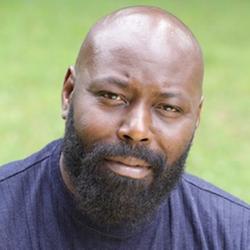 |
|
| Randall Kenan (photo: Miriam Berkley) |
|
Randall Kenan, "the unapologetically Black, gay Southerner who used all his identities to tell the stories only he could tell," died August 28 at age 57, the News & Observer reported. He had heart-related health problems and had suffered a stroke several years ago.
Kenan's first novel, A Visitation of Spirits, was published in 1989, followed by a 1992 short story collection, Let the Dead Bury Their Dead, which was nominated for the Los Angeles Times Book Award for Fiction, was a finalist for the National Book Critics Circle Award and was one of the New York Times Notable Books of the year.
His other work included nonfiction books--a YA biography of James Baldwin; Walking on Water: Black American Lives at the Turn of the Twenty-First Century; and The Fire This Time.
Kenan's most recent short story collection, If I Had Two Wings, was published a month ago by Norton, and he also just published an essay, "Letter from North Carolina: Learning from Ghosts of the Civil War," about Chapel Hill, N.C., in "the season for toppling Confederate monuments."
Kenan won a Guggenheim Fellowship, a Whiting Award, the Sherwood Anderson Award, the John Dos Passos Prize and the 1997 Rome Prize from the American Academy of Arts and Letters. He received the North Carolina Award for Literature in 2005 and was made a Fellow of the Fellowship of Southern Writers in 2007. He was inducted into the North Carolina Literary Hall of Fame in 2018.
Author Lee Smith called Kenan "one of America's best short story writers. He took a lot from old Black folk tales and passed it down... I think he owes a lot to the Southern oral tradition and the church."
Author Allan Gurganus said of Kenan: "I always loved his sense of humor... his work was beautiful. It was the work of a born storyteller. It had all the charm of folklore and fairytales with surprising turns. It was beguiling and filled with wit and wisdom."
Ed Southern, executive director of the North Carolina Writers' Network, said Kenan "probably has as significant of an impact of any North Carolina writer of the last 40 or 50 years. He had a national and international reputation and audience. He remained deeply rooted in North Carolina." Southern added that Kenan was "unfailingly generous" to aspiring writers. "There are writers across the country, who are at work today because of his teaching and encouragement."
Daniel Wallace, the director of the creative writing program at UNC-Chapel Hill, where Kenan was a professor of English and Comparative Literature, said Kenan was "a brilliant writer and a mentor to so many writers who came behind him--particularly young, Black gay writers who looked at him as a hero. His best work was ahead of him. On every conceivable level this is a tragedy."

